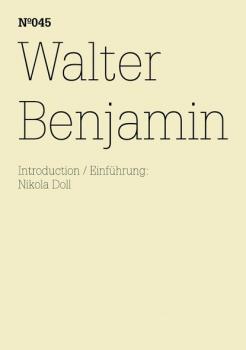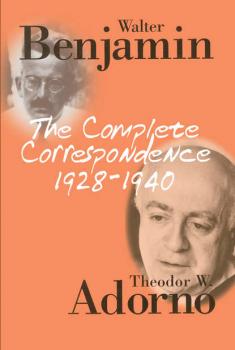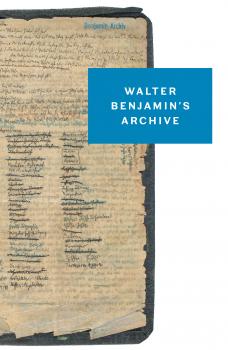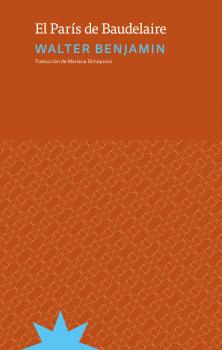ТОП просматриваемых книг сайта:
Walter Benjamin
Список книг автора Walter BenjaminАннотация
1927 begann Walter Benjamin anlässlich eines mehrmonatigen Paris-Aufenthalts mit seinen Überlegungen zu den Pariser Passagen, seinem ambitioniertesten, als Geschichtsphilosophie des 19. Jahrhunderts geplanten Buchprojekt. Aufgrund des mehrfach unterbrochenen Arbeitsprozesses und schließlich des Freitods Benjamins 1940 in Portbou auf der Flucht vor den deutschen Besatzern blieb das Projekt unvollendet und wurde posthum als Das Passagen-Werk veröffentlicht. Aus den Fragmenten ging unter anderem der Essay »Das Kunstwerk im Zeitalter seiner technischen Reproduzierbarkeit« (1935-1939) hervor. In ihrer Einführung zu einer Auswahl von handschriftlichen Notizen Benjamins verdeutlicht Nikola Doll den Versuch des Autors, »das Prinzip der Montage als erkenntnistheoretische Technik zu integrieren«. Dabei bilden farbige Verweissysteme, Schemata und Diagramme Leitlinien, die durch das Dickicht der Exzerpte und Zitate führen. Benjamins persönliches Farbcodierungssystem zeugt von seinem Versuch, Ordnung innerhalb der Konstellationen seiner Notizen zu schaffen, und von der Spannung zwischen dem Drang zur Struktur und dem Potenzial des offenen Feldes seiner Interessen. Walter Benjamin (1892-1940) war Autor und Philosoph. Nikola Doll (*1970) ist Kunsthistorikerin und Kuratorin. Sprache: Deutsch/Englisch
Информация о книге
Автор произведения Walter Benjamin
Жанр Изобразительное искусство, фотография
Серия E-Books
Аннотация
We must see to it that we put the best of ourselves in our letters; for there is nothing to suggest that we shall see each other again soon. So wrote Walter Benjamin to Gretel Adorno in spring 1940 from the south of France, shortly before he took his own life. The correspondence between Gretel Adorno and Walter Benjamin, published here in its complete form for the first time, is the document of a great friendship that existed independently of Benjamin's relationship with Theodor W. Adorno. While Benjamin, alongside his everyday worries, writes especially about those projects on which he worked so intensively in the last years of his life, it was Gretel Karplus-Adorno who did everything in her power to keep Benjamin in the world. She urged him to emigrate and told him about Adorno's plans and Bloch's movements, thus maintaining the connection between the old Berlin friends and acquaintances. She helped him through the most difficult times with regular money transfers, and organized financial support from the Saar region, which was initially still independent from the Third Reich. Once in New York, she attempted to entice Benjamin to America with her descriptions of the city and the new arrivals from Europe though ultimately to no avail.
Аннотация
The surviving correspondence between Walter Benjamin and Theodor W. Adorno. This is the first time all of the surviving correspondence between Adorno and Benjamin has appeared in English. Provides a key to the personalities and projects of these two major intellectual figures. Offers a compelling insight into the cultural politics of the period, at a time of social and political upheaval. An invaluable resource for all students of the work of Adorno and especially of Benjamin, extensively annotated and cross-referenced.
Аннотация
A beautiful collection of the legendary thinker’s short stories The Storyteller gathers for the first time the fiction of the legendary critic and philosopher Walter Benjamin, best known for his groundbreaking studies of culture and literature, including Illuminations, One-Way Street and The Arcades Project. His stories revel in the erotic tensions of city life, cross the threshold between rational and hallucinatory realms, celebrate the importance of games, and delve into the peculiar relationship between gambling and fortune-telling, and explore the themes that defined Benjamin. The novellas, fables, histories, aphorisms, parables and riddles in this collection are brought to life by the playful imagery of the modernist artist and Bauhaus figure Paul Klee.
Аннотация
This collection of the legendary thinker’s radio broadcasts brings together some of his most accessible and fascinating thinking. Walter Benjamin was fascinated by the impact of new technology on culture, an interest that extended beyond his renowned critical essays. From 1927 to ’33, he wrote and presented something in the region of eighty broadcasts using the new medium of radio. Radio Benjamin gathers the surviving transcripts, which appear here for the first time in English. This eclectic collection demonstrates the range of Benjamin’s thinking and his enthusiasm for popular sensibilities. His celebrated “Enlightenment for Children” youth programs, his plays, readings, book reviews, and fiction reveal Benjamin in a creative, rather than critical, mode. They flesh out ideas elucidated in his essays, some of which are also represented here, where they cover topics as varied as getting a raise and the history of natural disasters, subjects chosen for broad appeal and examined with passion and acuity. Delightful and incisive, this is Walter Benjamin channeling his sophisticated thinking to a wide audience, allowing us to benefit from a new voice for one of the twentieth century’s most respected thinkers.
Аннотация
An absorbing selection of Walter Benjamin’s personal manuscripts, images, and documents. The work of the great literary and cultural critic Walter Benjamin is an audacious plotting of history, art, and thought; a reservoir of texts, commentaries, scraps, and fragments of everyday life, art, and dreams. Throughout his life, Benjamin gathered together all kinds of artifacts, assortments of images, texts, and signs, themselves representing experiences, ideas, and hopes, each of which was enthusiastically logged, systematized, and analyzed by their author. In this way, Benjamin laid the groundwork for the salvaging of his own legacy. Intricate and intimate, Walter Benjamin’s Archive leads readers to the heart of his intellectual world, yielding a rich and detailed portrait of its author.
Аннотация
Infància a Berlín cap al 1900 recull una sèrie de textos que Walter Benjamin va publicar en diversos diaris i revistes entre els anys 1932 i 1938 i que el filòsof Theodor Adorno va editar per primer cop en forma de llibre el 1950.El mosaic d'escrits que integren aquest volum retraten la infància de Benjamin en el si d'una família acomodada del Berlín Oest al tombant dels segles XIX i XX . Anticipant-se a la imminència de l'exili i al comiat forçós a la seva ciutat natal, l'escriptor s'endinsa amb cada relat a les profunditats de la memòria i deixa constància d'un món que està a punt de desaparèixer, alhora que representa poèticament la seva particular concepció de la història.Considerada una de les creacions més personals i líriques de Benjamin, Infància a Berlín cap al 1900 és una obra mestra de la prosa del segle XX .
Аннотация
Por su insatisfacción frente al dominio de la burguesía, Baudelaire logró expresar más de su época que lo enunciado por cualquier otra creación literaria de temática social, pero fueron necesarias las interpretaciones de Walter Benjamin –señala Rolf Tiedemann–, para descubrir en el poeta al historiador oculto de aquello en lo que se convertirían, bajo el capitalismo, los proveedores de la fuerza de trabajo. El libro Charles Baudelaire. Un poeta lírico en la era del auge del capitalismo, proyectado inicialmente en el marco del Libro de los pasajes, al igual que este, quedó inconcluso. Este volumen reúne los textos centrales de ese legado: «El París del Segundo Imperio en Baudelaire» y «Sobre algunos temas en Baudelaire», pensados como capítulos pero que constituyen en sí trabajos cerrados, y «Zentralpark», que recopila fragmentos y notas que permiten un examen acabado del fundamento filosófico de los dos primeros. Además, se incluye el exposé «París capital del siglo xix», borrador en el que Benjamin expone sucintamente el marco temático del Libro de los pasajes, y el prólogo de Tiedemann a los tres primeros textos en la edición alemana de 1974. Este libro es, sin dudas, el abordaje más completo a las reflexiones de Benjamin en torno a Baudelaire y las relaciones entre poesía y capitalismo.










